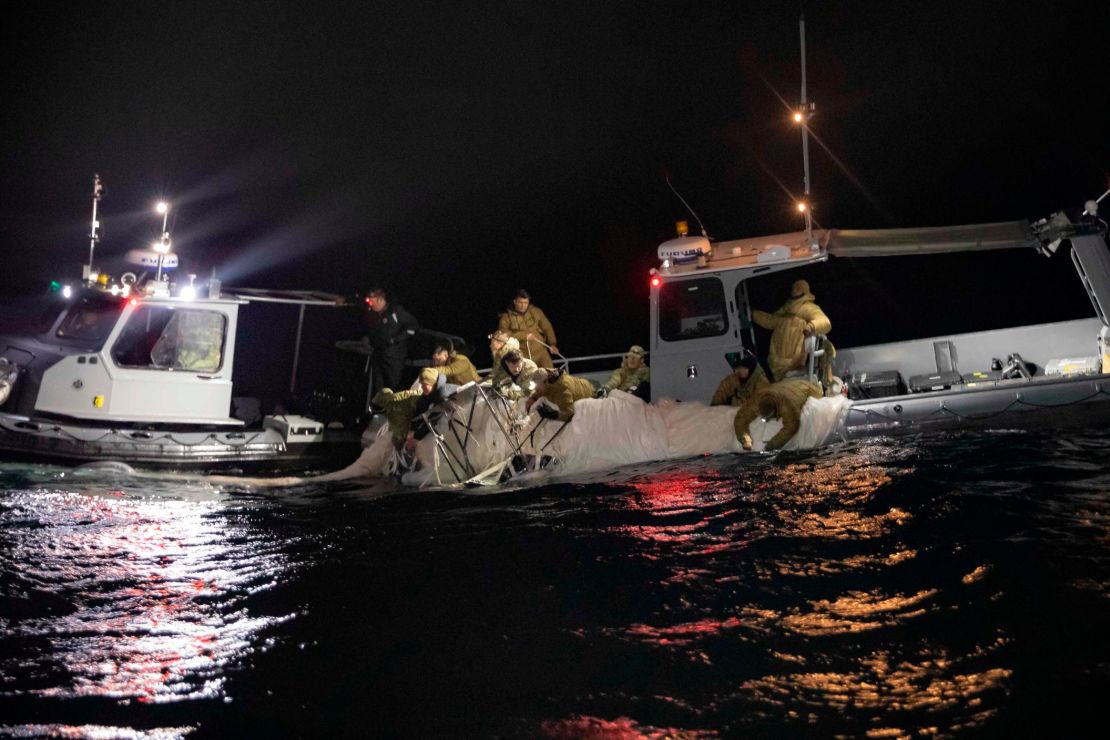An unidentified object was shot down 10 miles off the frozen coast of Alaskaon Friday afternoon, US officials announced, but details about the object are scarce.
US military pilots sent up to examine the object gave conflicting accounts of what they saw, which is part of the reason why the Pentagon has been cautious in describing what the object actually is, according to a source briefed on the intelligence.
The incident marked the second time that US jets had taken down an object in less than a week, following the shooting down of a suspected Chinese spy balloon off the coast of South Carolina last week.
On Saturday, the North American Aerospace Defense Command said it was monitoring “a high altitude airborne object” over northern Canada, and military aircraft are currently operating in the area from Alaska and Canada, according to a news release from the agency.
Canadian Prime Minister Justin Trudeau announced shortly after that he ordered the downing of the object.
It’s currently not clear what this object is or whether it has any relation to the Chinese spy balloon or the object shot down over Alaska.
Trudeau said he spoke with President Joe Biden on Saturday and that Canadian forces will lead the object recovery operation.
The object taken down Friday, which officials have not characterized as a balloon, was shot down at 1:45 p.m. EST, according to Pentagon spokesman Brig. Gen. Patrick Ryder, who said recovery teams are now collecting the debris that is sitting on top of ice in US territorial waters.
The object “came inside our territorial waters – and those waters right now are frozen – but inside territorial airspace and over territorial waters,” National Security Council coordinator for strategic communications John Kirby told reporters on Friday. “Fighter aircraft assigned to US Northern Command took down the object within last hour.”
Asked about the operation on Friday afternoon, Biden told CNN, “It was a success.”
Here’s a look at what we know so far about the object shot down on Friday.
Many questions remain

US President Joe Biden waits on the South Lawn of the White House before welcoming Brazilian President Luiz Inacio Lula da Silva and Rosangela Janja da Silva in Washington, DC, on February 10, 2023. Andrew Caballero-Reynolds/AFP/Getty Images
F-35 fighter jets were sent up to investigate after the object was first detected on Thursday, according to a US official. Kirby told reporters that the first fly-by of US fighter aircraft happened Thursday night, and the second happened Friday morning. Both brought back “limited” information about the object.
But the pilots later gave differing reports of what they observed, the source briefed on the intelligence said.
Some pilots said the object “interfered with their sensors” on the planes, but not all pilots reported experiencing that.
Some pilots also claimed to have seen no identifiable propulsion on the object, and could not explain how it was staying in the air, despite the object cruising at an altitude of 40,000 feet.
The conflicting eyewitness accounts are partly why the Pentagon has been unable to fully explain what the object is, the source briefed on the matter said.
In a statement Saturday, US Northern Command said the command has no new information to share about the object’s “capabilities, purpose or origin,” but noted that recovery efforts are being affected by Arctic weather conditions, “including wind chill, snow and limited daylight.”
The statement added that “fighter aircraft” downed the “high altitude airborne object” on Friday following an order from Biden and said recovery operations for the remains of the object continue Saturday in coordination with the FBI and local law enforcement.
Kirby said Friday that Biden was first briefed on the object on Thursday evening, as “soon as the Pentagon had enough information.” It “did not appear to be self-maneuvering,” Kirby said.
It’s unclear what the object looks like, or where it came from. On Friday, Ryder said it was traveling north east across Alaska. He declined to provide a physical characterization, only saying that it was “about the size of a small car” and “not similar in size or shape” to the Chinese surveillance balloon that was downed off the coast of South Carolina on February 4.
“We’re calling this an object because that’s the best description we have right now,” Kirby said. “We don’t know who owns it – whether it’s state-owned or corporate-owned or privately-owned, we just don’t know.”
Object was a ‘reasonable threat’
There was not a significant concern about damage to people or property if the object was shot down, which was the primary reason the Chinese surveillance balloon was allowed to traverse the continental US last week.
Ryder also emphasized that officials do not know the origin of the object, which did not appear to be manned and that it was shot down because it posed a “reasonable threat to civilian air traffic” as it was flying at 40,000 feet.
Ultimately, the object was downed near the Canadian border and northeastern Alaska by a F-22 fighter jet out of Joint Base Elmendorf-Richardson, Alaska, equipped with an AIM-9X – the same aircraft and missile used to take down the surveillance balloon. A US official said the military waited to shoot the object down during daylight hours to make it easier for the pilots to spot it. Ryder said the mission was “supported with aerial assets from the Alaska Air National Guard.”
The Alaska National Guard and units under US Northern Command, along with HC-130 Hercules, HH-60 Pave Hawk, and CH-47 Chinook are all participating in the effort to recover the object, Ryder said.
No apparent connection to the Chinese balloon

Sailors assigned to Explosive Ordnance Disposal Group 2 recover a high-altitude surveillance balloon off the coast of Myrtle Beach, South Carolina, February 5, 2023.Petty Officer 1st Class Tyler Thompson/US Navy
Officials have given no indication so far that the object is at all related to the Chinese surveillance balloon downed last weekend, debris of which is still being recovered on the Atlantic Ocean floor.
Ryder said Friday that recovery teams have “mapped the debris field” and are “in the process of searching for and identifying debris on the ocean floor.”
“While I won’t go into specifics due to classification reasons,” Ryder said, “I can say that we have located a significant amount of debris so far that will prove helpful to our further understanding of this balloon and its surveillance capabilities.”
When asked Friday if lessons learned about China’s balloon assisted in detecting the object shot down over Alaska, Ryder said it was “a little bit of apples and oranges.”
The object did not appear to have any surveillance equipment, according to a US official, which would make it both smaller and likely less sophisticated than the Chinese balloon shot.
